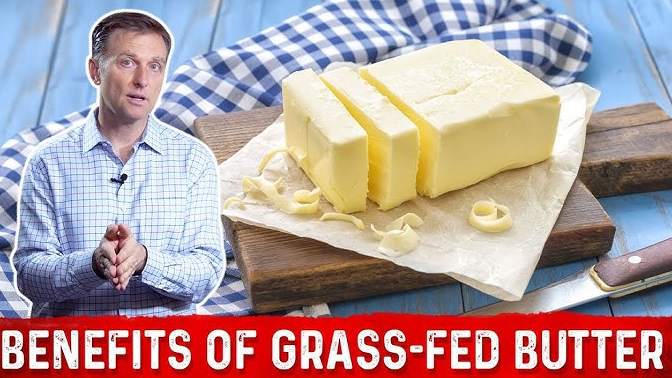Why Is Grass-Fed Butter Better? Unlocking Its Health Benefits
Butter has long been a staple in kitchens worldwide, adding flavor and richness to countless dishes. However, not all butter is created equal. When it comes to choosing a healthier option, grass-fed butter stands out. But why is grass-fed butter better? Let’s delve into its nutritional advantages and how it can contribute to a healthier lifestyle.
What Is Grass-Fed Butter?
Grass-fed butter is made from the milk of cows that graze on pasture, consuming a diet primarily of grass and forage. This natural diet contrasts with that of grain-fed cows, which are typically fed a diet of grains and other supplements. The difference in diet significantly impacts the nutritional profile of the butter produced.
Nutritional Superiority of Grass-Fed Butter
1. Higher Omega-3 Fatty Acids
Grass-fed butter contains higher levels of omega-3 fatty acids compared to its grain-fed counterpart. Omega-3s are essential fats that play a crucial role in brain function and may reduce inflammation. Studies have shown that butter from grass-fed cows can have up to 26% more omega-3 fatty acids than butter from grain-fed cows .
2. Rich in Conjugated Linoleic Acid (CLA)
Conjugated Linoleic Acid (CLA) is a type of fat found in grass-fed butter that has been linked to various health benefits, including improved immune function and potential anti-cancer properties. Grass-fed butter can contain up to five times more CLA than butter from grain-fed cows .
3. Abundant in Fat-Soluble Vitamins
Grass-fed butter is a rich source of fat-soluble vitamins, particularly vitamin A, which is essential for vision, immune function, and skin health. Additionally, it contains vitamins D, E, and K, all of which play vital roles in maintaining overall health .
4. Higher in Beta-Carotene
The diet of grass-fed cows, rich in green plants, leads to higher levels of beta-carotene in their milk. Beta-carotene is an antioxidant that the body converts into vitamin A, supporting eye health and immune function .
Health Benefits of Grass-Fed Butter
Supports Heart Health
The increased omega-3 content in grass-fed butter can contribute to heart health by reducing inflammation and improving cholesterol levels. Additionally, the presence of CLA may further support cardiovascular health .
Enhances Immune Function
The vitamins and antioxidants found in grass-fed butter, including vitamins A and E, play a crucial role in supporting the immune system, helping the body fend off illnesses and infections .
Promotes Healthy Skin
The combination of vitamin A and other nutrients in grass-fed butter can contribute to healthy skin by promoting cell growth and repair, reducing inflammation, and protecting against oxidative stress .
Aids in Weight Management
Some studies suggest that the CLA in grass-fed butter may help in weight management by increasing fat oxidation and reducing fat storage. However, it’s important to consume it in moderation as part of a balanced diet .
How to Incorporate Grass-Fed Butter into Your Diet
Incorporating grass-fed butter into your diet is simple and can enhance the flavor and nutritional profile of your meals. Here are some ideas:
-
Spread on Toast or Bread: Use it as a spread for your morning toast or bread for a rich, creamy taste.
-
Cooking and Baking: Substitute regular butter with grass-fed butter in your cooking and baking recipes to boost the nutritional content.
-
Add to Vegetables: Toss steamed or roasted vegetables with a pat of grass-fed butter for added flavor.
-
Mix into Mashed Potatoes: Enhance the creaminess of mashed potatoes by adding grass-fed butter.
Conclusion
In conclusion, grass-fed butter offers a range of nutritional benefits that make it a superior choice over regular butter. From higher levels of omega-3 fatty acids and CLA to an abundance of essential vitamins and antioxidants, it supports heart health, immune function, and overall well-being. By incorporating grass-fed butter into your diet, you can enjoy its rich flavor and health benefits.
FAQs About Grass-Fed Butter
1. Is grass-fed butter suitable for those on a keto diet?
Yes, grass-fed butter is a good fit for keto diets due to its high-fat content and low carbohydrate levels, making it an excellent source of healthy fats.
2. Can grass-fed butter help with weight loss?
While grass-fed butter contains CLA, which may aid in fat metabolism, it’s calorie-dense. Consuming it in moderation as part of a balanced diet can be beneficial.
3. Does grass-fed butter have a different taste than regular butter?
Yes, grass-fed butter often has a richer, more complex flavor due to the cows’ natural diet, which includes a variety of grasses and plants.
4. Is grass-fed butter more expensive than regular butter?
Generally, yes. The production of grass-fed butter involves more sustainable farming practices and a natural diet for cows, which can increase costs.
5. Can I use grass-fed butter for baking?
Absolutely. Grass-fed butter can be used in baking just like regular butter, often enhancing the flavor and texture of baked goods.
6. Where can I purchase grass-fed butter?
Grass-fed butter is available at many health food stores, supermarkets with organic sections, and online retailers. Look for reputable brands that source their butter from pasture-raised cows.
